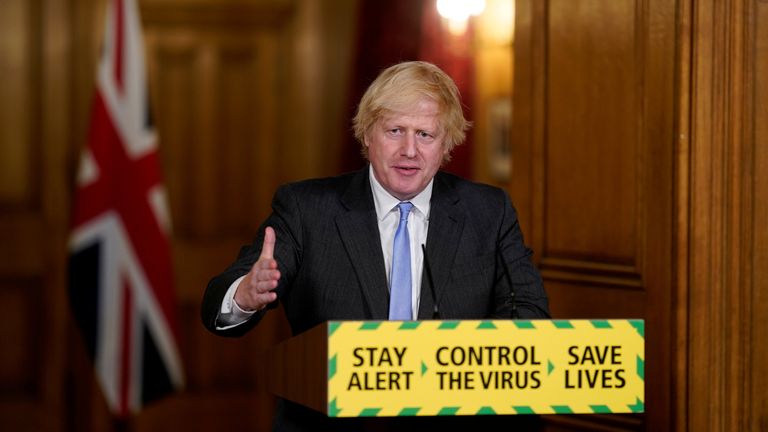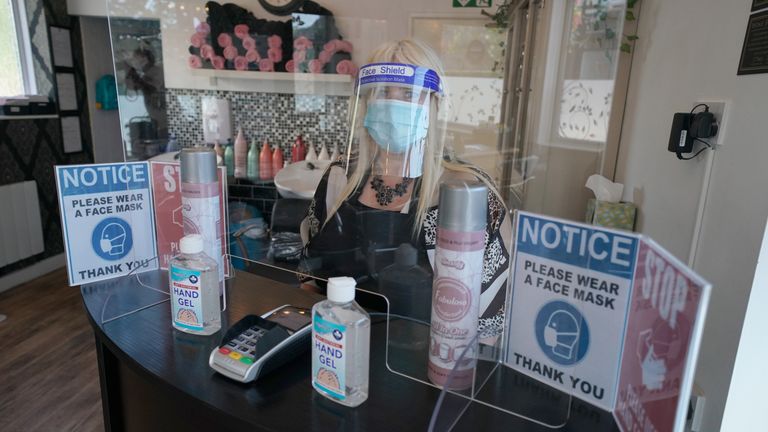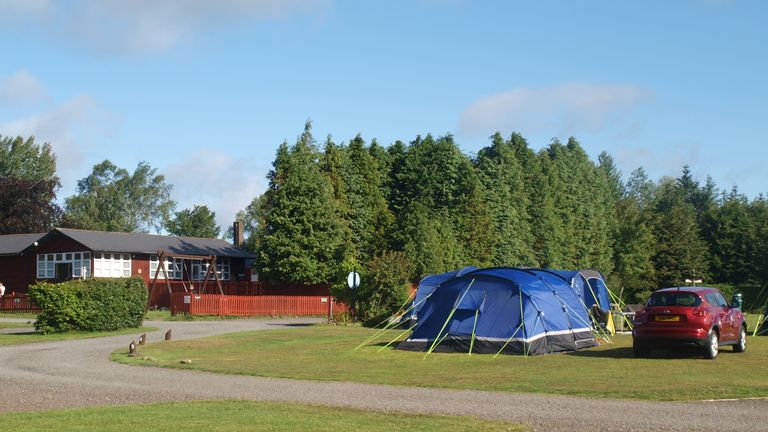Pubs, restaurants, hairdressers, hotels and historic sites will have to keep customers' details for 21 days under plans to limit the spread of coronavirus.
New guidance for England has been issued to businesses that are allowed to reopen from 4 July so they remain "COVID secure" as lockdown rules are relaxed.
The guidance includes advice on Boris Johnson's reduction of the two-metre rule to one metre if two is not viable - but only with "risk mitigation" such as face masks.
The government has provided advice for four different types of businesses: restaurants, pubs and bars, "close contact services" such as hairdressers, spas and tailors, hotels, and "heritage locations" such as churches and historic houses.
All of them must keep a temporary record of customers for 21 days and help NHS Test and Trace with requests for that data if needed.
Here are the new rules for different businesses
Restaurants, bars, pubs and takeaways:
- Businesses in the same area need to consider the "cumulative impact" of many venues re-opening by working together, with local authorities and travel operators to assess the risk and apply "additional mitigations"
- This could include further lowering capacity, staggering entry times to avoid queues, arranging one-way travel routes between transport hubs and venues, advising patrons to avoid particularly crowded forms of transport or routes
- Plan for social distancing in the event of adverse weather conditions
- Ensure customers do not need to "unduly" raise their voices to hear each other by not playing loud music or TV
- Reducing number of surfaces touched by staff and customers - so ordering food and drinks directly to the table instead of at the counter.
Close contact services (hairdressers, beauty salons, tattoo studios, spas, massage therapy and tailors):
- Place markings on the floor to show people where to sit
- Encourage customers to turn up to appointments exactly on time, and on their own, so they do not congregate in waiting areas
- If there is a queue this should be outside
- Customers should be seated away from each other and side to side, with at least one metre between them
- Till points must have perspex screens while doors and windows are to be kept open to increase ventilation
- Screens should be used, where practical, to create a barrier between work stations
- Hairdressers must wear a protective visor that extends below the chin, but do not need to wear a face mask
- Disposable equipment must be used, and if it cannot then it should be washed between clients
- Customers can choose to wear a face mask but it is not mandatory, and must wash or sanitise hands when entering
- They must bring their own drinks, and if not, disposable cups must be used
- No magazines
- Music must be turned down low so people do not shout
- Blow drys are allowed.
Hotels and guest accommodation:
- Private rooms with en suite bathrooms, or one designated shower per guest room, can reopen
- Outdoor accommodation, such as campsites, can reopen with shared shower facilities if clear use and cleaning guidance is provided but all other shared facilities should be closed
- Reception areas must be cleaned more and screens placed in between guests and staff
- Minimise lift usage, drop off room service outside and encourage tips to be added to the bill
- Housekeeping staff must following handwashing guidance and make a checklist of all hand contact surfaces to be cleaned
- Guests should be encouraged to wear masks in corridors
- Clean keys and key cards between guests
- Make staff accessible via phone, emails and guest apps and encourage contactless payment or pre-payment
- Business events at hotels are not allowed.
Heritage locations (historic buildings, monuments, sites, parks, gardens):
- Introduce a pre-booking system, stagger entry times and ensure new guidance is summarised clearly for guests at the entrance
- Arrange one-way travel routes between transport and the location, as well as in venues if social distancing is an issue
- Encourage visitors to avoid handling products while browsing
- Visitors who do not observe social distancing and hand washing measures should be refused services or entry
- Restrict numbers to avoid overcrowding and limit tour numbers to avoid guides shouting
- Find out the best way to regularly clean surfaces, this may be difficult for sensitive historic surfaces so they may have to be covered or rooms closed
- Have temporary markings to stop overcrowding, taking into consideration any possible lasting damage on historic surfaces - free standing signs are best
- Clean toilets more and have a visible cleaning schedule
- Clean audio guides between uses
- Stop repair work if there is no way to social distance
:: Listen to the Daily podcast on Apple Podcasts, Google Podcasts, Spotify, Spreaker
- Give volunteers extra time to get up to speed with new ways of working
- No indoor performances
- Guided tours may have to be stopped if building layout cannot accommodate social distancing
- Have a test run of new arrangements to make people feel safe and welcome.
https://news.google.com/__i/rss/rd/articles/CBMia2h0dHBzOi8vbmV3cy5za3kuY29tL3N0b3J5L2Nvcm9uYXZpcnVzLXRoZXNlLWFyZS10aGUtbmV3LXJ1bGVzLWJ1c2luZXNzZXMtbXVzdC1pbXBsZW1lbnQtdG8tcmVvcGVuLTEyMDEzODc40gFvaHR0cHM6Ly9uZXdzLnNreS5jb20vc3RvcnkvYW1wL2Nvcm9uYXZpcnVzLXRoZXNlLWFyZS10aGUtbmV3LXJ1bGVzLWJ1c2luZXNzZXMtbXVzdC1pbXBsZW1lbnQtdG8tcmVvcGVuLTEyMDEzODc4?oc=5
2020-06-24 14:13:21Z
52780862215756



Tidak ada komentar:
Posting Komentar